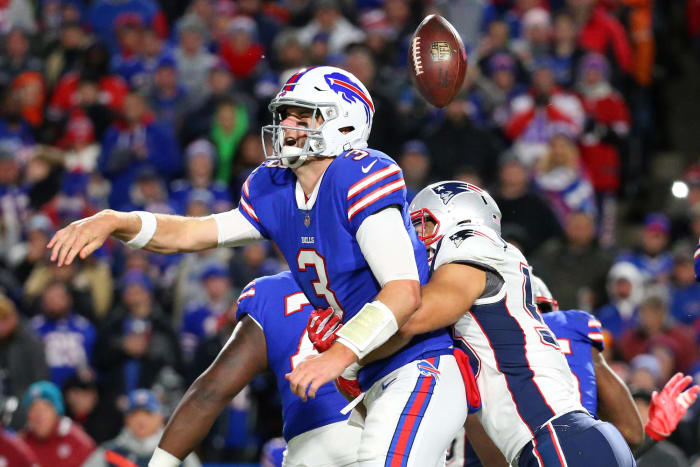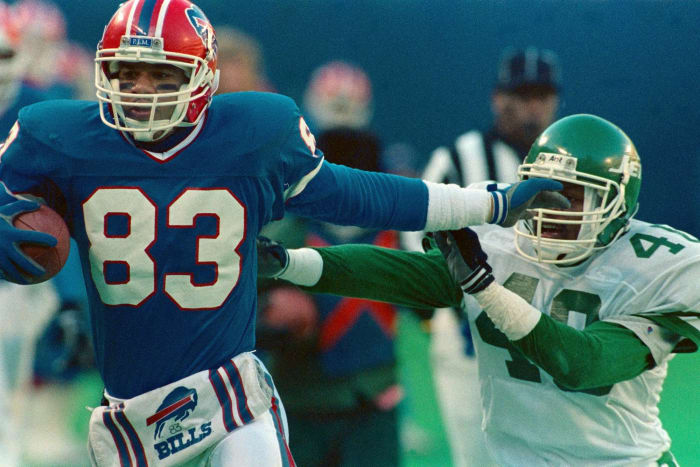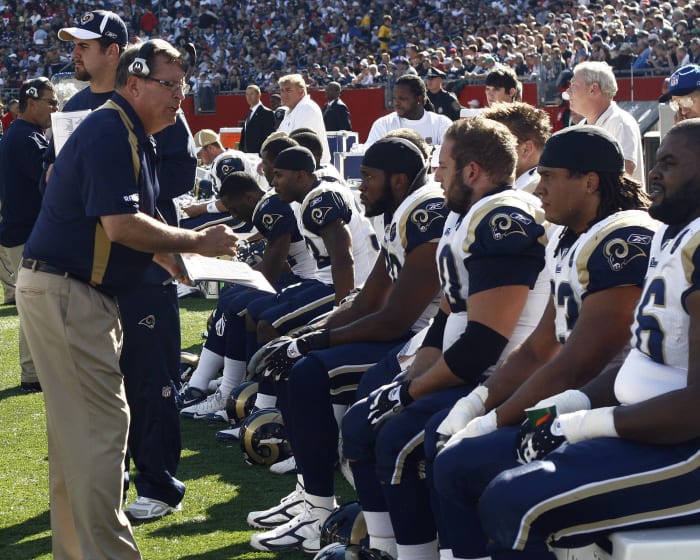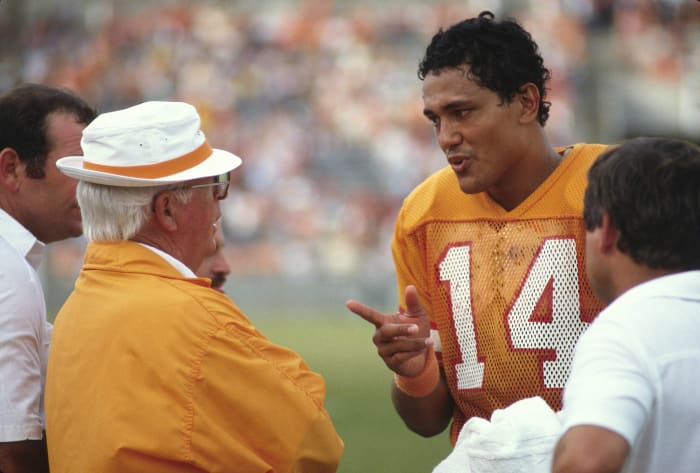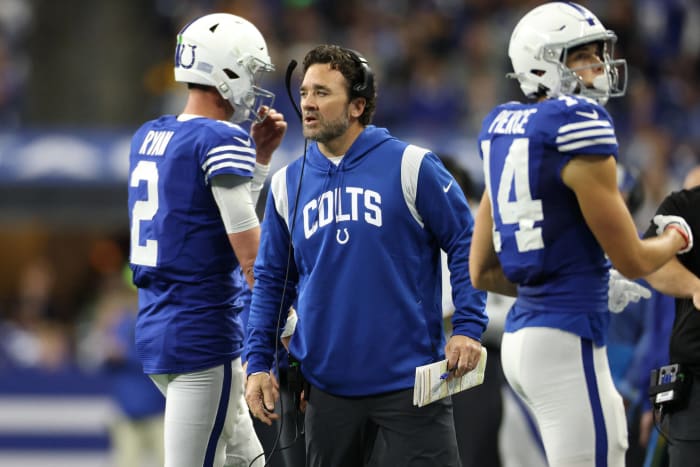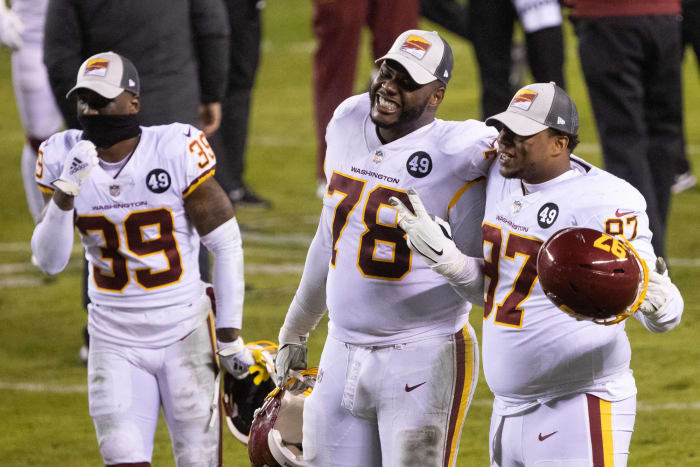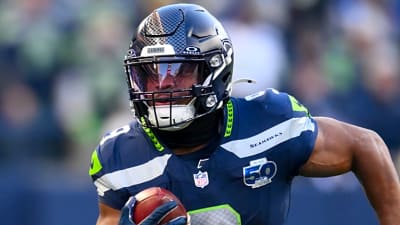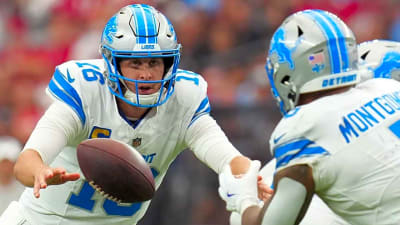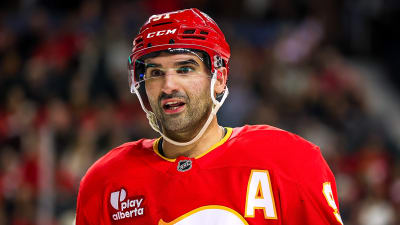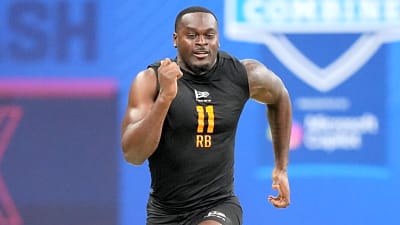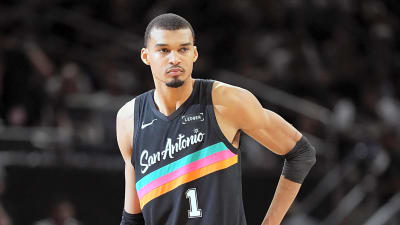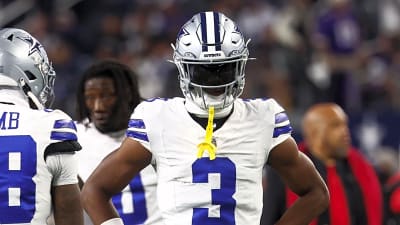From the division that produced "Beastquake" to Tom Brady's finale, here are the NFL's worst divisions since the 1970 merger created the modern divisional structure.
Rich Barnes-USA TODAY Sports
In five seasons since 2007, each member of the Bills-Dolphins-Jets troika finished with a negative point differential. This gave the high-powered Patriots consistent margins for error. The '18 Pats endured three blowout losses but still comfortably won the division at 11-5. Buffalo, Miami and New York each ended the season being outscored by over 100 points — the only time this happened during New England's run. The Bills and Jets each deployed rookie QBs in rebuilding years, and the second-place Dolphins (7-9) soon launched an aggressive rebuild. This futility helped the Pats become the first 11-win AFCer to secure a bye since 2002.
Bettmann-Getty Images
Perhaps the most unbalanced NFL season, 1989 produced seven 10-plus-win NFC teams and just one in the AFC. The Bills won this division but went 9-7 — their only sub-10-win slate from 1988-93 — and earned the label the "Bickering Bills" for several disputes. Said arguments involved Jim Kelly, Thurman Thomas and a fight between assistant coaches. It didn't matter. The Colts and the defensively challenged Dolphins each went 8-8, missing one of the easiest AFC playoff fields to enter. The Jets (minus-158) and Pats combined for nine wins. The on-the-cusp Bills lost a second-round playoff shootout in Cleveland.
Icon Sportswire/Getty Images
This division's lack of quality allowed the Packers to stay afloat while Aaron Rodgers rehabbed a broken collarbone. Green Bay's all-world passer missed six games, and the Packers lost backup Seneca Wallace in his first start. They then moved from Scott Tolzien then old friend Matt Flynn — available after the Seahawks and Raiders ditched him — and won the division at 8-7-1 when Rodgers returned for a do-or-die regular-season finale in Chicago . The Bears (8-8) lost Jay Cutler for a time but saw Josh McCown deliver in relief. The third-place Lions (7-9) finished with the division's only plus point differential.
Focus on Sport-Getty Images
The Vikings' hopes at stringing together a run of NFC Central titles and winning the Herschel Walker trade vanished in 1990. In his first full Vikings season, Walker played 16 games but rushed for just 770 yards. The Vikings finished 6-10. A not especially memorable Bears team (10-6) strolled to the division title because the Packers, Lions and Buccaneers also finished 6-10. Jim Harbaugh threw 10 touchdown passes in 14 starts in a run-oriented offense. The Bears beat the 8-8 Saints in Round 1 of the playoffs but, to the chagrin of their "SNL" backers, then suffered a blowout loss to the the eventual Super Bowl champion Giants.
Bettmann-Getty Images
After John McKay's Buccaneers rose from an 0-14 expansion team to playing in the 1979 NFC championship game, Tampa Bay's 1981 edition claimed a division title. However, the Doug Williams-led team went 9-7, beat no winning teams and lost, 38-0, to the Cowboys in its playoff opportunity. The Bucs went 6-2 in a division that featured two 8-8 teams — the Lions and Packers — and the 7-9 Vikings and 6-10 Bears. Detroit's plus-75 point differential led the way, while Minnesota was in transition. This was Chicago's final season before the Mike Ditka-Jim McMahon partnership revived the franchise.
Focus on Sport-Getty Images
Although the Rams won seven straight NFC West titles in the 1970s, this was their only Super Bowl appearance in that span. The NFC champs went 9-7 despite playing in a friendly division; its teams went 13-27 in non-division play. Never able to find a steady quarterback during this run after trading Roman Gabriel, the Rams outscored opposition by only 14 points in 1979. Fortunately for them, the Falcons and 49ers — in Bill Walsh's first year — won eight combined games. In their best 1970s season, the Saints went 8-8. After two road playoff wins, the Rams could not hold a late lead over the favored Steelers in Super Bowl XIV.
Bettmann-Getty Images
In Chuck Noll's third year, the Steelers had not quite put it together. The future superpower finished 6-8 and second in the Central — ahead of the four-win Bengals and Oilers, the latter going through a brutal early-'70s stretch. This left the Browns (9-5, plus-12 differential) in the driver's seat. Nick Skorich's first season as Cleveland's coach doubled as ex-Pro Bowler Bill Nelsen's final year as the Browns' full-time QB. Cleveland beat defending Super Bowl champion Baltimore in Week 2. However, despite the Browns winning their final five regular-season games, the Colts beat them, 20-3, in Johnny Unitas' final playoff win.
Todd Kirkland-Icon Sportswire
Eli Manning's first Super Bowl march began in Tampa; that 24-14 game is rarely mentioned. The Buccaneers went 9-7 but still won this division by two games, with high-level journeyman Jeff Garcia securing Jon Gruden's most recent playoff berth. The 37-year-old quarterback teamed up with Joey Galloway to steer the Bucs to a January home game. An issue during much of Drew Brees' New Orleans years: the Saints could not overcome a poor defense. They and the Panthers (minus-80) went 7-9. The Falcons (4-12) in 2007 saw their quarterback go to prison and coach Bobby Petrino desert them . This led to the 2008 Matt Ryan pick.
Matthew Emmons-USA TODAY Sports
The Cowboys had an excuse for a miserable 2020 season; their much healthier 2019 squad did not. Jason Garrett's Cowboys finale featured an 8-8 finish and a season-defining Week 16 loss to an injury-ravaged Eagles team. After doling out several lucrative extensions, the Cowboys went 1-7 against teams with winning records, and the Eagles (9-7) — a preseason Super Bowl prediction mainstay — voyaged to the playoffs without their starting wideouts. Carson Wentz still fared well, however, in his final season as Philly's full-time QB1. This season brought miserable Giants and Washington squads, and a Week 16 Giants win over their rivals cost them Chase Young.
Focus on Sport-Getty Images
The Rams dominated this division for much of the 1970s, rarely encountering much resistance. The Falcons and Saints struggled for most of the decade, and in 1976 the NFL placed the expansion Seahawks in the NFC West. After going 2-12, Seattle was shipped to the AFC West. New Orleans and Atlanta each went 4-10. Collectively, those three teams were outscored by 433 points. While the 49ers went 8-6, their Jim Plunkett trade quickly veered off course. Seven of Los Angeles' 10 wins came in division games. The Rams started three QBs in 1976 but rode their defense to the NFC championship game.
11 of 27
1985 AFC Central
George Gojkovich-Getty Images
Decades before the 8-8 division champion became an annual possibility, the 1985 Browns blazed a trail. Marty Schottenheimer and Bernie Kosar's first season together produced an 8-8 record and a minus-7 differential. The Browns did not even need to win their season finale to gain playoff access, thanks to the Steelers and Bengals going 7-9 and the rebuilding Oilers finishing 5-11. Earnest Byner and Kevin Mack became the third duo to each rush for 1,000 yards, and the backs' 200-plus-yard day in Miami staked Cleveland to a 21-3 divisional-round lead. The Browns lost that lead but were an AFC power for the rest of the decade.
Matt A. Brown-Icon Sportswire
Wild swings placed the Broncos and Chargers on a collision course. Denver became the first team to blow a three-game division lead with three to play. It took a Dwayne Bowe botched onside kick recovery in Week 15 to even put the 5-8 Bolts in position to make history. Both teams finished 8-8. Denver (minus-78) got there with Ed Hochuli's help in the first San Diego matchup. The Chiefs and JaMarcus Russell-piloted Raiders combined for seven wins and a minus-274 differential. After the Bolts mauled the Broncos in Week 17, an electric Darren Sproles night lifted the Chargers to an upset over the 12-4 Colts in Round 1.
Robert E. Klein-Icon Sportswire
The Cardinals went 9-7 and, at plus-1, were the only NFC West team to outscore their opponents. Kurt Warner's bunch lost four games by at least 19 points, including a 47-7 defeat to the Tom Brady-less Patriots, and ranked 20th in DVOA. But the 49ers (7-9 in Mike Singletary's "I want winners" season), Seahawks (4-12) and especially dreadful Rams (2-14, with a staggering minus-233 differential) were no threat. The division went 10-30 against non-NFC West foes. The Cards raised the division's profile in January, though, when Larry Fitzgerald's historic seven-touchdown playoffs nearly powered them to a championship.
14 of 27
1983 NFC Central
Focus on Sport-Getty Images
Competitive mediocrity existed in the Central between the Purple People Eaters years and Buddy Ryan's 46 defense. The last gap year produced the Lions' only division title between 1957 and 1991. Their William Gay-Doug English D-line tandem combined for 26.5 sacks in 1983. Detroit went 9-7 and gave San Francisco a divisional-round scare , but this season was an aberration. The Bears, Packers and Vikings went 8-8. Per their usual during this era, the Bucs dragged down the division. Tampa's trade for ex-QB prospect Jack Thompson backfired, with its 2-14 season turning the traded pick into 1984's No. 1 overall choice.
Jeff Hanisch-USA TODAY Sports
In March 2016, the Texans signed Brock Osweiler to a four-year, $72 million contract. By March 2017, the Texans traded him in an NBA-style salary dump. The Texans lost J.J. Watt early in the season, had a minus-49 point differential and dropped their Week 17 game to the 9-7 Titans. Thanks to a No. 1 defense, Houston still won the AFC South and a playoff game over a Raiders team starting a third-string QB. The Colts went 8-8, but Andrew Luck took 41 sacks and suffered a career-altering shoulder injury. Blake Bortles' first major letdown led to the Jags going 3-13. They soon passed on Patrick Mahomes and Deshaun Watson, the latter heading to Houston.
Icon Sports Media
Two years before Kurt Warner's renaissance season had the Cardinals in Super Bowl XLIII, team brass viewed the Hall of Famer as a stopgap and drafted Matt Leinart 10th overall. Leinart took the reins in late September for a 5-11 Cards team that could not compete even in a dreadful division. As they usually did in this period, the Seahawks won this division, going 9-7. But every '06 NFC West team had a negative point differential. The 7-9 49ers trailed the pack at minus-114, in Alex Smith's second year. Seattle managed to win a playoff game, but Tony Romo's infamous PAT bobble aided that effort.
17 of 27
1978 NFC Central
Bettmann-Getty Images
Every member of this quintet posted a point differential between minus-10 and minus-21. Fran Tarkenton's final season came for a declining Vikings team, but both they and the Packers went 8-7-1. The teams tied in Week 13, but the Vikings made the playoffs on the strength of their Week 8 win. Bart Starr's Packers squad won just one of its final seven games. The 7-9 Bears saw their QBs restrain reigning MVP Walter Payton by combining for a staggering 7-28 TD-INT ratio. In their third season, the Bucs showed signs of life in going 5-11. The Rams routed the Vikings, 34-10, in the teams' playoff opener.
Rich Gabrielson-Icon Sportswire
Tim Tebow completed 46.5% of his passes but led the Broncos (8-8, minus-81) on a six-game win streak once Mike McCoy transformed Denver's offense for the run-oriented QB. The popular southpaw's playoff walk-off pass to Demaryius Thomas became a signature 21st-century play, but John Elway traded Tebow two months later. Denver needed consistently clutch defense and a few long Matt Prater field goals to enable "Tebowmania," and the team received help from a mediocre AFC West. The Chiefs lost Matt Cassel to injury for a spell and went 7-9, while the 8-8 Chargers ruined the 8-8 Raiders' division title hopes with a Week 17 knockout win.
Mark J. Rebilas-USA TODAY Sports
As the football world kept waiting for the Buccaneers to figure it out, their rivals' struggles ensured they did not have to. The Bucs became the fourth team to win a division with a sub-.500 record (8-9). They finished with a minus-45 differential and needed two Tom Brady rescues — and an overtime win over a Trace McSorley-quarterbacked Cardinals team — to avoid 5-12. The Panthers fired Matt Rhule after five games, started 1-6 and traded Christian McCaffrey; they played for a division title in Week 17. The Falcons and Saints (each 7-10) keep this division from all-time infamy, but Brady's unretirement did not go for a good cause.
Trevor Ruszkowski-USA TODAY Sports
This quartet featured a talent-starved Texans team amid one of the lengthiest rebuilds in years. It included an injury-besieged Titans outfit that fired its GM midseason. And Jim Irsay's Jeff Saturday madness. This allowed the Jaguars, who started 2-6, to make noise earlier than expected. The Texans and Colts each closed with differentials south of minus-130, with Indy blowing an NFL-record 33-point lead, and waged a Week 18 battle that involved a Houston Hail Mary — a Lovie Smith middle finger of sorts — gifting the Bears 2023's No. 1 draft slot. Needless to say, the Jags (9-8) have their rivals outflanked in the wake of this debacle.
Jerome Miron-USA TODAY Sports
Kirk Cousins' " You like that! " season produced a 9-7 record and some of Washington's passing marks falling, but the division champs beat no winning teams and lost a one-sided wild-card game to the Packers. This season also featured unimposing Cowboys and Eagles squads, the former playing without an injured Tony Romo most of the way in a 4-12 effort and the latter ending its Chip Kelly experiment that December. The 7-9 Eagles did beat the 6-10 Giants in Tom Coughlin's finale, however. Washington's plus-9 differential led the way in a season that was in no way indicative of the division's future.
22 of 27
1984 AFC Central
Rob Brown-Getty Images
The 1984 Steelers enjoyed astonishing early-season circumstances. The Bengals started 0-5, the Browns 1-8 and the Oilers 0-10. Yet Pittsburgh stood just 7-7 after a December Astrodome defeat. Terry Bradshaw retired after the '83 season, giving way to Mark Malone, who helped John Stallworth to a vintage year (1,395 yards). But the Steelers (9-7) barely held off a Bengals team that rallied back to 8-8. The Browns and Oilers combined for eight wins, the latter being outscored by 197 points. This group went 13-27 in non-division games. Pittsburgh advanced to the AFC title game, meeting a scorching-hot Dan Marino.
Ron Wurzer-Getty Images
We return to the aughts NFC West, which sent two teams to the playoffs in 2004. Both were outscored over the course of the season, and Rams-Seahawks III received the undesired Saturday-afternoon timeslot. The 8-8 Rams beat the 9-7 Seahawks for a third time, despite ranking 30th in DVOA. Michael Vick's Falcons routed the overmatched team in Round 2. The 49ers traded Terrell Owens and cut Jeff Garcia, giving the keys to Tim Rattay and ex-Miami Hurricanes star Ken Dorsey in a 2-14 season that led to 2005's Alex Smith-over-Aaron Rodgers decision. This division did, however, showcase Jerry Rice's final games ( in hideous uniforms).
Ronald C. Modra/Getty Images
This division had J.J. Watt...and little else. Watt won his third Defensive Player of the Year award and helped a limited Texans team to 9-7, with Bill O'Brien toggling between QBs Brian Hoyer and Ryan Mallett during a rough period for Texan signal-callers. One of two teams to start 1-4 and make the playoffs that year, Houston lost 30-0 to the other one — Kansas City — in Round 1. This season began Andrew Luck's injury woes; the Colts lost their rising star after seven games. Blake Bortles threw a garbage time-fueled 35 touchdown passes; the Jags went 5-11. The Titans went 3-13 in Marcus Mariota's rookie year.
Tony Medina-Icon Sportswire
After the NFC West's teams spent years in plot development during the worst division run in NFL history, the climax did not disappoint. The 6-9 Seahawks beat the 7-8 Rams in a flexed "Sunday Night Football" spot to win the division, doing so with a minus-97 point differential. Matt Hasselbeck's four-touchdown pass night (and that run) showed how pivotal division titles are. Seven- or eight-win home teams are 4-3 in the playoffs since 2002. The 49ers went 6-10 in their last pre-Jim Harbaugh season, and the Cardinals went 5-11 following Kurt Warner's retirement. The Rams' mediocre 2010 came in between two-, one- and two-win seasons.
Mark Lyons-Icon Sportswire
In between a 12-win 2013 and 2015's Cam Newton-piloted Super Bowl run, the Panthers won this division despite not winning a game between Oct. 6 and Dec. 6. Their 7-8-1 record bettered the 2010 Seahawks' mark, with a superior point differential (minus-35). But collectively, this NFC South quartet went 22-41-1 (11-28-1 against non-division foes). Tampa Bay's 2-14 season, which set up its Jameis Winston pick, seals this division's place. The Saints ranked 31st defensively in a 7-9 slate; the Falcons went 6-10. The Panthers did manage to win their wild-card game, but it involved Cardinals third-stringer Ryan Lindley.
Bill Streicher-USA TODAY Sports
Dak Prescott's October injury set the 2020 NFC East on course for all-time ignominy; the quartet went 11-28-1 against non-NFC East teams and saw a team start 2-7 and win a division. Washington (7-9) started four QBs; the division started 12 overall. Alex Smith's miracle comeback and a stout D-line helped Washington to a plus-6 differential and provide a vital escape hatch after Dwayne Haskins struggled. It did take Doug Pederson benching Jalen Hurts late in Week 17 to ensure the 6-10 Giants were denied playoff entry — days before the Eagles fired their Super Bowl-winning coach. Those Dak-less Cowboys also set a franchise record for points allowed (473).

 +
+
